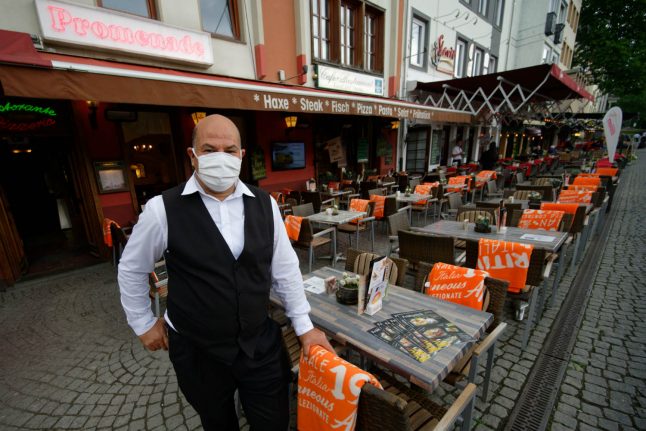People who fail to give accurate contact details to establishments to enable contact tracing face a €250 fine, reported RP Online.
NRW health minister Karl-Josef Laumann, of the centre-right Christian Democrats, announced the plans on Wednesday.
The fine is aimed at the person who gave the wrong details. However, hosts must also check the plausibility of the information on the lists, Laumann said.
The amount of the fine and further measures to contain coronavirus in Germany's most populous state will be laid out in the updated Corona Protection Law for NRW, which will come into force on Thursday.
On Tuesday, Chancellor Angela Merkel and the leaders of Germany's 16 states agreed to tighten Covid-19 measures across the country.
Among the new rules are caps on the number of people at parties in badly-hit coronavirus areas, and fines for people who give false contact tracing details.
READ ALSO: 'More masks, less parties': Germany limits events and family gatherings to curb coronavirus
After the meeting, NRW state premier Laschet announced there would be higher fines in NRW. Above all, the penalty would have to be higher than the current fine of €150 for people who refuse to wear masks on public transport, he said.
And, he said, the risk of infecting other people with the virus during meetings in restaurants, for example, is higher than on trains, so the fine needed to reflect that.
“In view of the falling temperatures, being in closed rooms for longer periods of time in autumn and winter and the imminent flu season, we must be particularly careful now,” said Laumann.
“This is particularly true in the area of leisure activities and private parties, which have recently been identified as one of the main causes of regional infections.”
The Robert Koch Institute reported 2,089 new coronavirus infections on Tuesday in Germany within 24 hours. The number of people who have died stands at 9.460.
On Saturday, 2,507 new corona infections were recorded, the highest figure since April.
Laschet said that it was in the health interest of each individual to leave his or her real name when visiting a public place. Contact tracing is “the key in the fight against the pandemic”, he said.



 Please whitelist us to continue reading.
Please whitelist us to continue reading.
Member comments